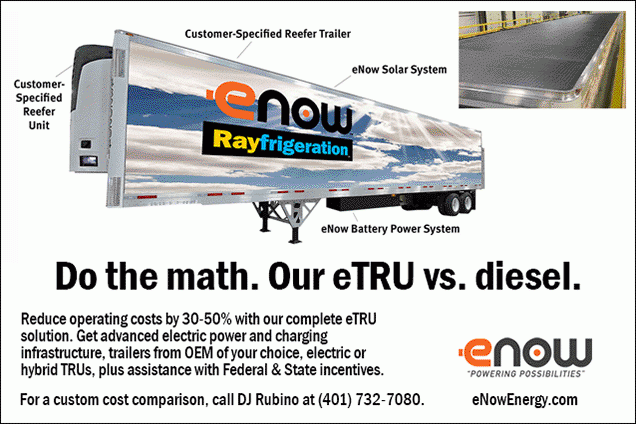President & CEO, eNow, Inc.
Why Do Electric TRU Trailers Cost 30-50% Less to Operate than Diesel?

There are two pressing reasons to take a close look at zero-emission, electric-TRUs (transport refrigeration units) before investing in more diesel TRUs: economic and environmental.
First, the economics. Electric TRUs reduce fleet operating costs starting on day one. They eliminate diesel fuel consumption and dramatically reduce maintenance and downtime that diesel reefers have been known for since they were introduced back in the late 1950s. Although more efficient than earlier models, today’s diesel reefers still only last 5-7 years, while new electric and hybrid reefer units from TK and Carrier generally have an asset life of 10-12 years.
So, eTRUs eliminate fuel costs, lower maintenance costs, and provide longer asset life.
Second, emission-reduction regulations are here to stay. While California may lead the country in environmental regulations, some cities and states across the country are following suit. New Jersey and Florida, for example, enforce their own clean air regulations but also offer incentives, including grants and rebates, to purchase or lease clean running eTRUs.
For many, the math makes transitioning from diesel to electric TRUs a no-brainer – especially since diesel fuel is at a record high. To understand why, let’s compare TCO (total cost of ownership), including incentives and operating costs.
First off, at eTRU trailer acquisition, there are significant cost savings. DERA, the federal government’s Diesel Emissions Reduction Program may provide fleets a 45 percent reimbursement for new all-electric reefer trailers. And for fleets running primarily in California, the California Air Resources Board’s CORE program provides up to $65,000 in incentives for clean-running equipment, plus $3,000 per charging plug. California also may provide up to 50 percent reimbursement of new all-electric TRUs and trailers through the Carl Moyer Memorial Air Quality Standards Attainment Program. All incentives are on a first-come basis.
Incentives aside, the operating cost savings eTRUs provide are indisputable, and easily calculated. For example, let’s assume your diesel TRU logs 2,000 annual run hours, and its diesel fuel consumption is .8 gallons per hour. That equals 1,600 gallons of diesel per year. Let’s assume diesel is at $4.00 per gallon, (a conservative figure since the national average is $5.50 as of 5/10/22). Your annual diesel TRU fuel costs would be $6,400, while an all-electric TRU’s fuel cost is zero.
Now let’s add diesel TRU maintenance costs to the equation. We’ll be conservative and assume diesel TRU’s maintenance costs are only double an electric TRU’s. Assuming a cost of $1.50 per hour and 2,000 hours of run time, a diesel TRU would cost $3,000 per year to maintain (not considering downtime). Based on its simpler design, an all-electric TRU would only cost $1,500 per year.
So based on this scenario, the total annual savings per TRU trailer would be $7,900, not including incentives.
Yes, the operating costs, savings, and incentives for electric TRUs vary by region and application. That’s why eNow offers custom TCO comparisons of diesel vs. electric TRUs for qualified fleets. And why we believe the savings make a compelling case to do the math and test our eTRUs now.
eNow is delivering the most advanced zero-emission, all-electric reefer trailers in the industry. For a custom-prepared cost comparison for your reefer fleet, call DJ Rubino at (401) 732-7080.
The above article is sponsor-generated content. To learn more about sponsor-generated content, click here.


